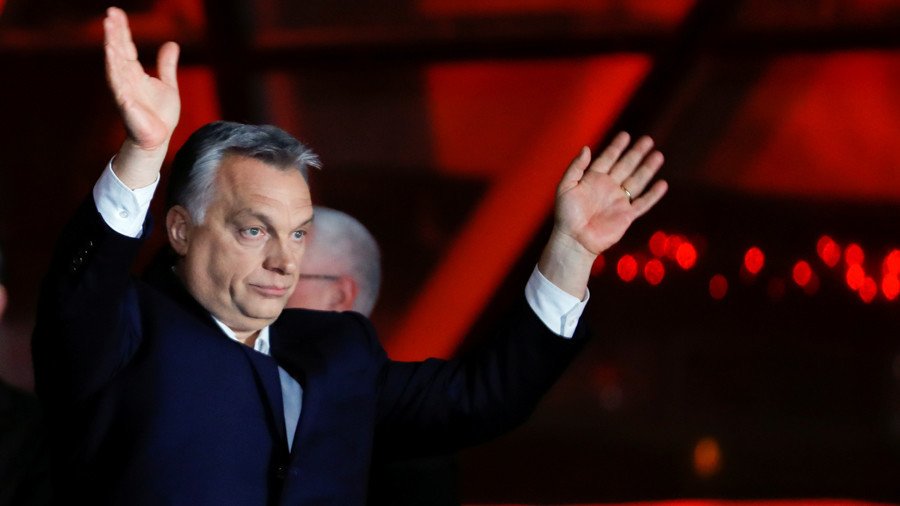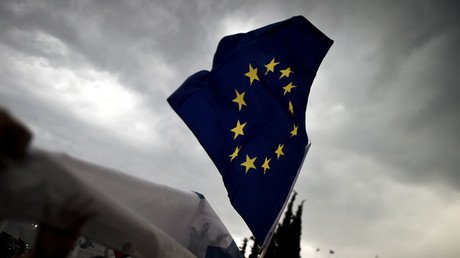'Orbanization' of Europe? Western media alarmed over Hungary PM's decisive victory

Not everyone in the West is happy about Viktor Orban's victory, in which he secured a third straight term as Hungarian prime minister. Some Western media call the result a serious warning and a problem for the EU and its values.
Orban's Fidesz party, with its strong anti-immigration agenda, won a large majority – 133 of the 199 seats in parliament – as it gained over 66.8 percent of the votes in Sunday's parliamentary election. It is the Hungarian Euroskeptic's third consecutive term and fourth overall, but these elections gained much attention in the wake of rising right-wing sentiments in Europe.
Some politicians welcomed the results, including Czech Prime Minister Andrej Babis, German Interior Minister Horst Seehofer, as well as Christian Social Union (CSU) member Manfred Weber. However, the latter's support for Orban was lambasted by Washington Post columnist Brian Klaas, who called Orban an "anti-Semitic, racist demagogue and an authoritarian… destroying" Hungarian democracy.
Shame on you. Orbán is an anti-Semitic, racist demagogue and an authoritarian who is systematically destroying the remnants of democracy in Hungary. You are enabling him. https://t.co/n1ndSPYFd0
— Brian Klaas (@brianklaas) 9 апреля 2018 г.
One of the EU member states, Luxembourg, also took a rather aggressive stance and called for its allies in the bloc, namely Germany and France, to stand against the elected Hungarian prime minister. Luxembourg's foreign minister warned that Hungary may even trigger a trend of "undermining values and scaremongering" across the EU.
"It is up to Germany and France, along with all member states that aren't counting on indifference, to weigh in unambiguously on the basis of the European treaties to neutralize this tumor of values,'' Jean Asselborn said, as quoted by Die Welt.
Those fears were echoed in a Die Welt opinion piece headlined "Now threatening Orbanization of Europe." The article links Orban's success with "Hungarian inferiority complex" and warns that the country is on the brink of sinking "into political coma" as it says that democratic change of power would hardly happen now. At the same time, the author raises alarm that the "Orban model" of democracy could be picked up by other European states, while Poland is constantly following Hungary's path.
"They have a deja vu in Brussels: Orban has done all of that before and the Poles are following in, although they are coming to this in a much more awkward way," the article reads. "Viktor Orban is preparing to become the EU's gravedigger."
French newspaper Le Monde was also generous in attaching labels to the Hungarian prime minister, as its editorial called him "populist" and the "troublemaker" of Europe. The newspaper argues that the scale of Orban's party success is "a serious warning for Brussels" that can be interpreted "as a strong encouragement for populist parties" in the bloc.
The article also urges the transnational European People's Party (EPP), which includes major European center-right parties and of which Orban's Fidesz party is a member, to condemn "the xenophobic discourse and the authoritarian drift of its Hungarian partner."
Maarten Rabaey, in his article for Belgian De Morgen, also cautioned Orban's European allies to take a tougher stance against him for "undermining European values."
"It's time Juncker and his party friends in the European People's Party called a halt to the way in which their 'party friend' Orban is undermining European values under the banner of the EU and the EPP," Rabaey wrote. "It is their duty to warn Orban that he won't be able to implement his xenophobic and anti-Semitic election program without serious consequences."
Meanwhile, it may be that not Orban, but the EU, has to change its position and face discussion over European values and basic principles, Konrad Krammar wrote for Austrian daily Kurier.
"But that also means not summarily dismissing Orban's ideas as undemocratic or anti-European but giving them serious consideration. Europe, whose credibility is already faltering, needs this debate about values," Krammar stated in an opinion piece.
















